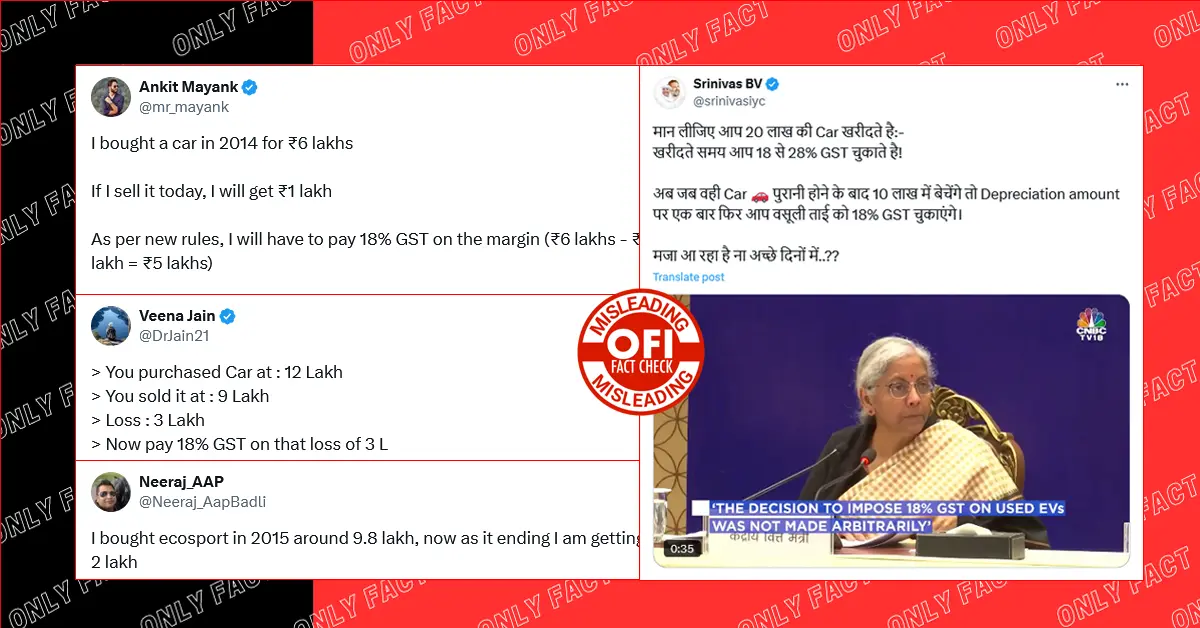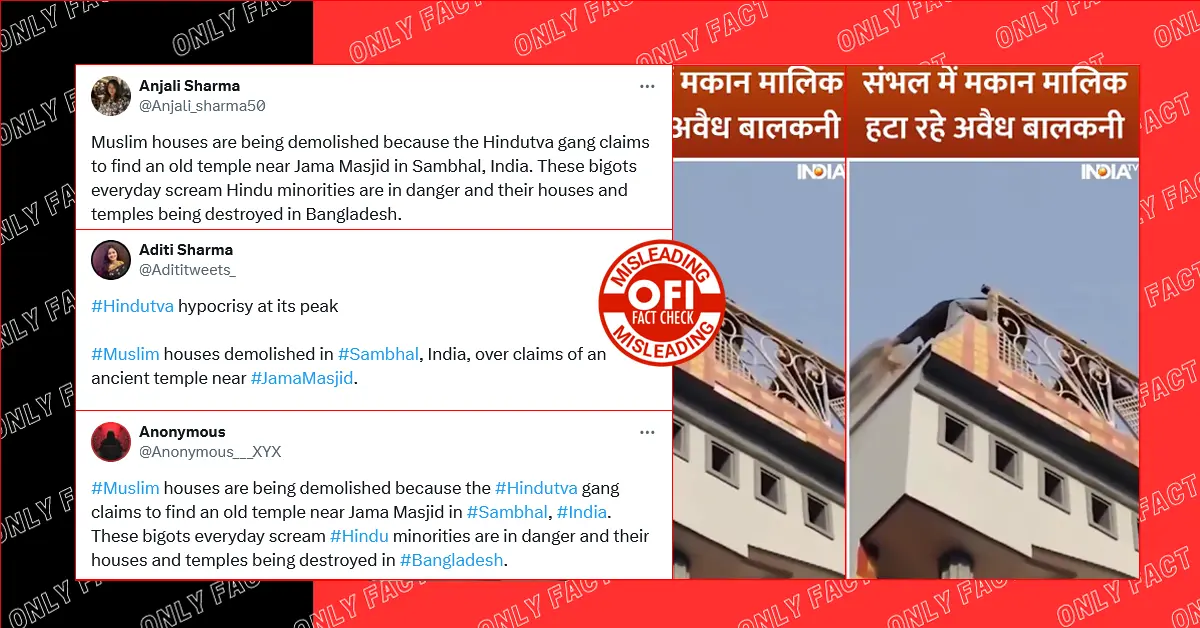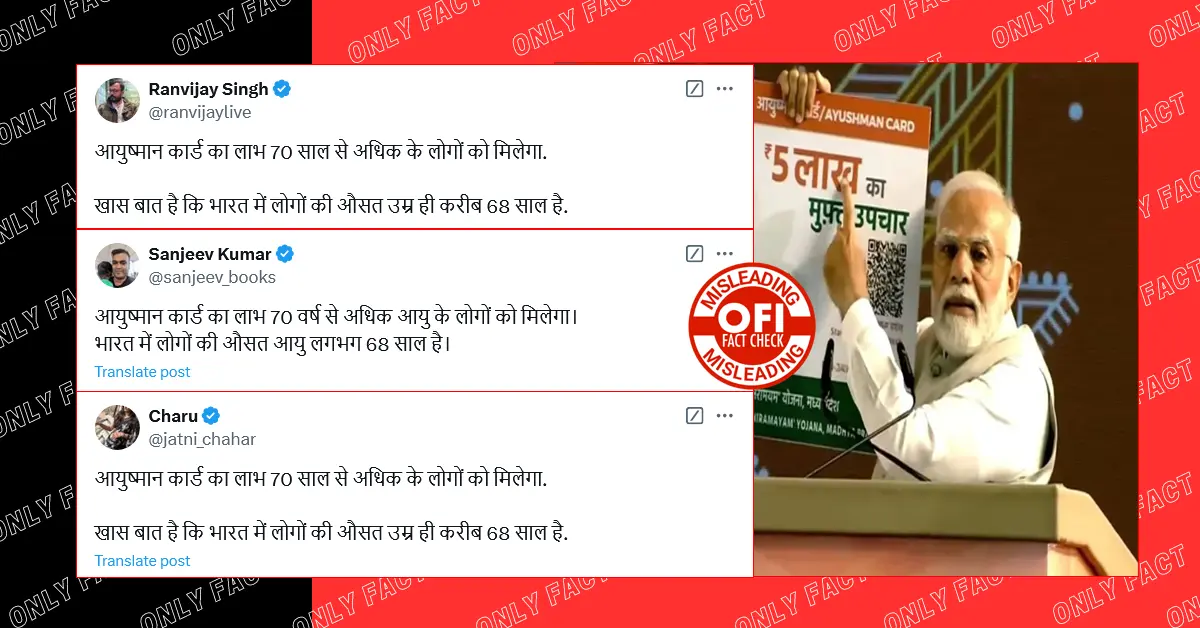On Saturday, the 55th GST Council meeting introduced several changes to the Goods and Services Tax framework. Among these, two key decisions garnered significant attention: the introduction of GST on popcorn and an increase in the tax rate on second-hand vehicles, including electric vehicles (EVs), from 12% to 18%. These proposals sparked widespread criticism on social media, with users ridiculing Finance Minister Nirmala Sitharaman.
Amidst the backlash, misinformation began circulating on social media. A viral claim suggests that individuals selling their used cars would be taxed on the profit—the difference between the car’s original purchase price and its resale price. To substantiate this claim, a 39-second video clip of Finance Minister Nirmala Sitharaman has been widely shared online.
Congress supporter Bhavika Kapoor claimed, ‘As per Sitharaman: I bought my diesel car in 2014 :Rs. 24 lacs. I sold my diesel car in 2024 : Rs 3 lacs 2024. Therefore, I have to pay 18% Goods and Services Tax, on 21 lacs ! (Margin as per her). GST : 21Lx 18% = 3,78,000. I won’t get anything from my car, top of it, I will have to pay Rs 78,000 from my pocket to conclude the transaction. Hello Nimmo tai, are you in your senses? What kind of extortion is this? Moorkh aurat.
As per Sitharaman:
— Bhavika Kapoor (@BhavikaKapoor5) December 23, 2024
I bought my diesel car in 2014 :
Rs. 24 lacs
I sold my diesel car in 2024 :
Rs 3 lacs 2024
Therefore, I have to pay 18% GST on 21 lacs ! (Margin as per her)
GST : 21Lx 18% = 3,78,000
I won't get anything from my car, top of it, I will have to pay Rs… pic.twitter.com/Lr1ajFl6A4
Ankit Moyank stated, ‘I bought a car in 2014 for ₹6 lakhs . If I sell it today, I will get ₹1 lakh. As per new rules, I will have to pay 18% Goods and Services Tax on the margin (₹6 lakhs – ₹1 lakh = ₹5 lakhs). So after selling the car, – I will get ₹10k – Modi Govt will get ₹90k. RIP middle class.’
I bought a car in 2014 for ₹6 lakhs
— Ankit Mayank (@mr_mayank) December 23, 2024
If I sell it today, I will get ₹1 lakh
As per new rules, I will have to pay 18% GST on the margin (₹6 lakhs – ₹1 lakh = ₹5 lakhs)
So after selling the car,
– I will get ₹10k
– Modi Govt will get ₹90k 🤣
RIP middle class 🙏🙏 pic.twitter.com/XhGfkB8p9n
Srinivas BV asserted, ‘Suppose you buy a car worth 20 lakhs :- You pay 18 to 28% Goods and Services Tax, while purchasing! Now when you sell the same car for Rs 10 lakh after it becomes old, then once again you will pay 18% GST to the recovery agent on the depreciation amount. Are you enjoying the good days ..??’
मान लीजिए आप 20 लाख की Car खरीदते है:-
— Srinivas BV (@srinivasiyc) December 23, 2024
खरीदते समय आप 18 से 28% GST चुकाते है!
अब जब वही Car 🚗 पुरानी होने के बाद 10 लाख में बेचेंगे तो Depreciation amount पर एक बार फिर आप वसूली ताई को 18% GST चुकाएंगे।
मजा आ रहा है ना अच्छे दिनों में..?? pic.twitter.com/XTG4EtSTxf
Besides this, Prashant Bhushan, Raj Bhaduri Aviator, Abhishek Raja Ram, Zee, Chiku, Dhruv Rathee Satire, CA Akhil Pachori, Shiva, Kabiran, Mohit Chauhan, Neeraj, Veena Jain, Arpit Sharma and Avishek Goyal also shared similar claims.
Fact Check
We began our fact-checking process by searching for relevant information on the topic. The Times of India article published on December 21, 2024, clarified that the GST Council decided to increase the GST rate on second-hand vehicles, including EVs, from 12% to 18%. This tax will only apply to the margin earned by the seller (the difference between the purchase price and selling price, adjusted for depreciation if claimed).
Currently, GST on old and used vehicles (other than certain high-capacity petrol and diesel vehicles) is set at 12%. For high-capacity petrol vehicles (engine capacity of 1200 cc or more and length exceeding 4000 mm), diesel vehicles (engine capacity of 1500 cc or more and length exceeding 4000 mm), and SUVs, the rate is already 18%. The Council has now made the rate uniform at 18% for all second-hand vehicles, including EVs.
Another Times of India article further clarified that this revised GST rate applies only to transactions by registered dealers or businesses reselling used vehicles. Private transactions between individuals remain exempt from GST. This ensures that individual car owners selling their vehicles privately are not affected by the change.
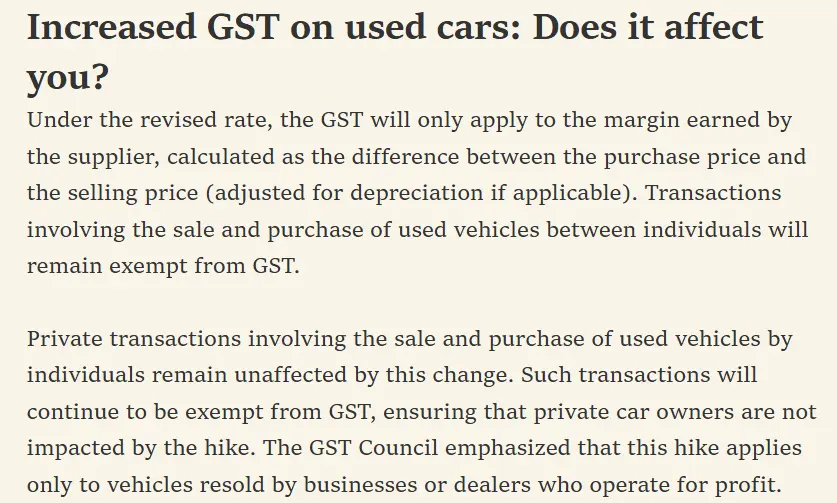
Moreover, the Tata Capital article confirmed that GST applies differently depending on whether the seller is registered under GST:
• Unregistered sellers (individuals): If a private individual sells a used car, the transaction is exempt from GST.
• Registered sellers (dealers): Registered dealers must charge GST on the sale of used cars, as these transactions are considered business activities under GST regulations.
Historically, GST on used cars was 28% plus an additional cess of 1%-15%, making second-hand cars expensive and shrinking the market. In 2018, the GST Council reduced the rate to 12%-18% and removed the additional cess, which significantly lowered used car prices and boosted the market.
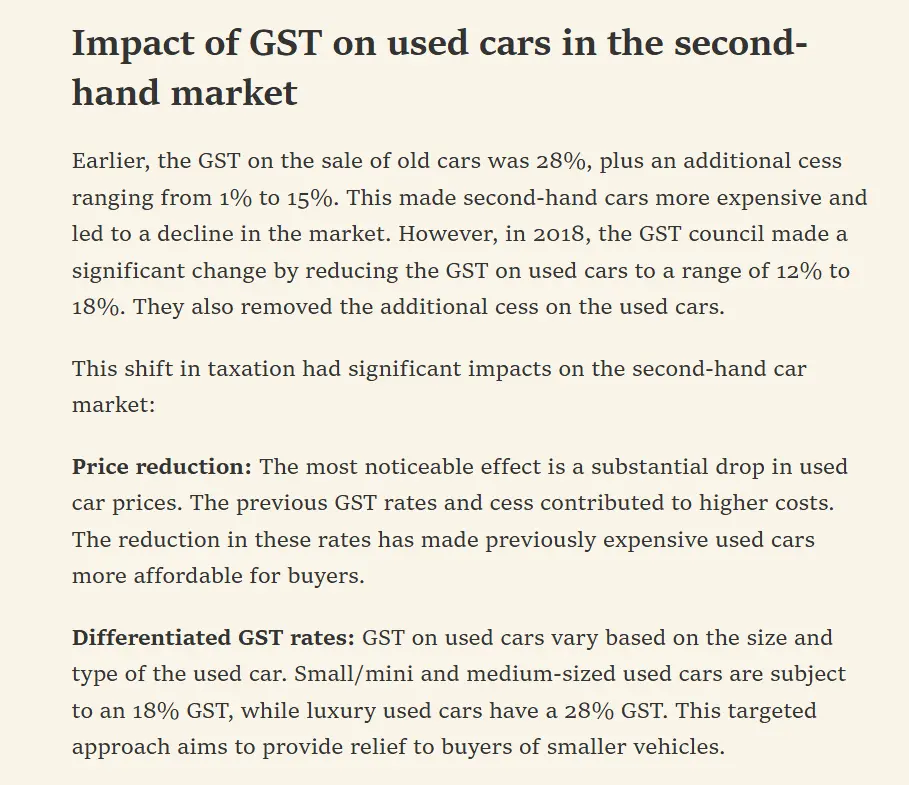
Therefore, the claim that individuals selling cars privately will be taxed on the difference between the purchase price and selling price is false. GST applies only to registered dealers reselling vehicles.
The GST Council introduced an interesting caveat in the revised tax framework for second-hand vehicles: the GST will be applied only to the difference between the purchase price and the selling price. “If depreciation benefits have been claimed, the depreciated value will be considered as the purchase price instead of the original amount paid for the vehicle.“
What does this mean?
1. For dealers not claiming depreciation:
GST is calculated on the profit margin, which is the difference between the price at which the dealer bought the used vehicle and the price at which it is resold.
For example: A dealer buys a used car for ₹4,00,000 and sells it for ₹4,50,000. The profit margin is ₹50,000, and GST (18%) will be charged only on ₹50,000, resulting in a tax of ₹9,000.
2. For dealers claiming depreciation:
If a dealer claims depreciation benefits on the vehicle for tax purposes, the depreciated value of the vehicle is considered the purchase price instead of the original price. The GST is then calculated on the difference between this depreciated value and the selling price.
For example: A dealer buys a used car for ₹5,00,000 and uses it as part of their business. Over time, depreciation reduces its value to ₹3,00,000. If the dealer later sells the car for ₹4,00,000, the profit margin for GST calculation will be ₹1,00,000 (₹4,00,000 – ₹3,00,000). GST (18%) will be charged on ₹1,00,000, resulting in a tax of ₹18,000.
Why this caveat matters:
This provision ensures that GST is applied fairly, reflecting the actual profit made by the seller. By considering depreciation, the rule acknowledges the wear and tear or reduced value of a vehicle over time, preventing over-taxation.
Will the GST be charged even when a seller incurs a loss?
Another claim circulating on social media suggests that GST would be charged even in cases where a seller incurs a loss, meaning the selling price of a vehicle is less than its purchase price. This claim is false.
The truth: Rule 32(5) of the Central Goods and Services Tax (CGST) Rules, 2017, explicitly addresses this situation. It states that if the value of supply (calculated as the difference between the purchase price and the selling price) is negative, it will be ignored for GST purposes. In simpler terms, no GST will be charged when the selling price of a used vehicle is lower than its purchase price. GST is only applicable on the profit margin, if any.
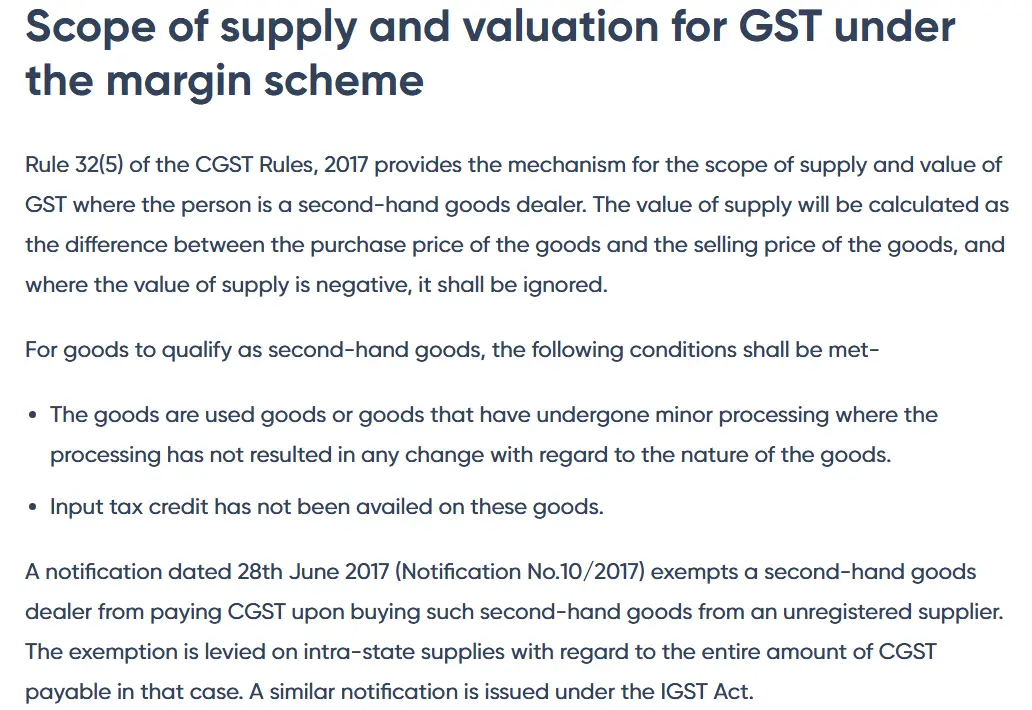
Key Facts:
1. Applicability of GST: The 18% GST applies only to registered dealers or businesses involved in the resale of used vehicles. It is calculated on the margin earned (difference between the buying and selling price, adjusted for depreciation).
2. Private Sales: Transactions involving the sale of used vehicles between private individuals remain completely exempt from GST. This exemption ensures that regular car owners are not impacted by the revised tax rate.
3. No GST on Losses: Rule 32(5) safeguards against GST being charged on losses. If a registered dealer sells a used vehicle at a loss, the GST rules ensure no tax liability arises from that transaction.
Conclusion:
The 18% GST rate applies solely to registered dealers on the profit margin they earn from reselling vehicles. Private transactions between individuals remain GST-exempt, and no tax is charged when vehicles are sold at a loss. Claims to the contrary are inaccurate and misleading, likely spread with the intent to fuel public discontent.
Also Read: Viral Image of Footballer Ronaldo Offering Namaz in Mecca is AI Generated

